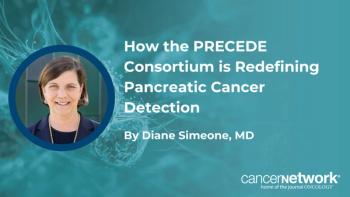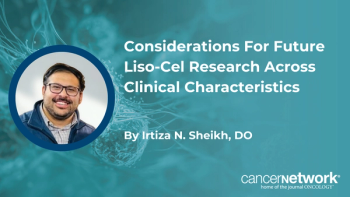
- ONCOLOGY Vol 15 No 3
- Volume 15
- Issue 3
Efficacy and Safety of Tositumomab/Iodine-131 Tositumomab in the Expanded Access Study: Interim Report From Two Institutions
Relapsed or refractory low-grade non-Hodgkin’s lymphoma (NHL) and transformed low-grade NHL are incurable diseases. Tositumomab/iodine-131 tositumomab (Bexxar) is a novel
Relapsed or refractory low-grade non-Hodgkin’s lymphoma (NHL) and transformed low-grade NHL are incurable diseases. Tositumomab/iodine-131 tositumomab (Bexxar) is a novel radioimmunotherapy that combines the activity of an anti-CD20 monoclonal antibody with tumor-targeted radiation. The dosing regimen is based on individualized dosimetry to deliver a patient-specific total-body radiation dose (in cGy), which accounts for interpatient variability and optimizes the safety and efficacy.
An expanded access trial was opened in July 1998 to allow patients with relapsed/refractory low-grade or transformed low-grade NHL to have access to this therapy. This report describes the results of 74 patients treated at two institutions. Their median age was 58 years (range: 29 to 87 years). Histology at entry was as follows: 4% small lymphocytic, 45% follicular small-cell, 34% follicular mixed, and 18% transformed. Stage at entry was 4% II, 34% III, and 60% IV; 30% had bulky disease (> 5 cm); 18% elevated lactate dehydrogenase; and 45% bone marrow involvement. The median number of prior chemotherapies was 2 (range: 1 to 9), and 34% of patients had previously received rituximab (Rituxan).
The tositumomab/iodine-131 tositumomab regimen consisted of day 1 tositumomab at 450 mg followed by 35 mg of iodine-131 tositumomab (5 mCi). Seven to 14 days later patients received tositumomab at 450 mg followed by a patient-specific dose of iodine-131 tositumomab to deliver a 65- or 75-cGy total-body dose. Seventy-six percent of patients responded to this regimen, with 32% achieving a complete response. The duration of response was 19 months (95% confidence interval: 6 mo to no response).
No patient had a serious infusion reaction and infusion rates were adjusted in only 4% of patients. The most common adverse event was reversible hematologic toxicity. Grade 4 neutropenia (absolute neutrophil count < 500 cells/µL) and thrombocytopenia (platelet count < 10,000 cells/µL) were observed in 8.5% and 3% of patients, respectively.
CONCLUSION: These data demonstrate that tositumomab/iodine-131 tositumomab can be delivered safely to relapsed/refractory low-grade and transformed low-grade NHL patients, including those previously treated with rituximab. The efficacy and safety data are similar to that previously reported, and confirm that tositumomab/iodine-131 tositumomab is a safe and effective novel therapeutic option in relapsed/refractory and transformed low-grade NHL patients.
Articles in this issue
almost 25 years ago
State of the Art of Non-Small-Cell Lung Cancer in the New Millenniumalmost 25 years ago
Novel Approaches in the Treatment of Non-Small-Cell Lung Canceralmost 25 years ago
Triplet Combination Chemotherapy and Targeted Therapy Regimensalmost 25 years ago
Gemcitabine and Nonplatinum Combinations in Non-Small-Cell Lung Canceralmost 25 years ago
Gemcitabine for the Treatment of Non-Small-Cell Lung Canceralmost 25 years ago
Gemcitabine in Combination With New Platinum Compounds: An Updatealmost 25 years ago
Treatment of Elderly Patients With Non-Small-Cell Lung Canceralmost 25 years ago
Optimizing Chemoradiation in Locally Advanced Non-Small-Cell Lung Canceralmost 25 years ago
Irinotecan in Gastrointestinal MalignanciesNewsletter
Stay up to date on recent advances in the multidisciplinary approach to cancer.





































